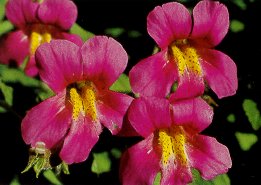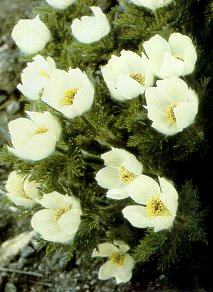
| Contents
81.2 The Third Patriarch - Seng Tsen 81.3 The Fourth Patriarch - Tao Hsin 81.4 The Fifth Patriarch - Hung Jen 81.5 The Sixth Patriarch - Hui Neng 81.1 The Second Patriarch - Hui Ko The transmission Gatha of Bodhidharma is as follows: My
aim in coming to this country The Gatha predicted that there would be five successors after Bodhidharma. They were:
After Hui Neng, the tradition of transmission of robe and bowl [衣砵] to the successor was banned. Hui Ko, also known as
Shen Kuang Hui Ko, was born in Hunan. He was well versed in classical
Buddhist studies when he was young. He was ordained to be a monk
at Lung Mun Hsiang Shan. Later, he went to Shao Lin Temple [少林寺]
and paid respect to Bodhidharma asking for his profound teaching.
Hui Ko asked Bodhidharma to accept him as a disciple, but was refused. Hui Ko waited outside the door in a snowy day. After a long time, the snow was so heavy that it came up to the waist of Hui Ko. Bodhidharma saw that he was really sincere in the pursuit of the Buddhist way. Then he asked Hui Ko, "What have you come for?" "My mind is not pacified. Please help me in pacifying my mind." Hui Ko replied. "Bring me your mind (heart), and I'll pacify it for you" shouted Bodhidharma. "But I cannot find my mind." Hui Ko said. "I have pacified your mind for you already!" said Bodhidharma. At this moment, Hui Ko was totally enlightened. Hui Ko left Bodhidharma when he was forty years old. In order to escape from being murdered by his jealous opponents and enemies, he hid for forty years. When he was eighty, he began to propagate the Buddhist teachings and transforming living beings. When Hui Ko was executed by the Emperor, it was said that Hui Ko did not bleed, but milky white fluid came out. The Emperor was astonished. He noted that Hui Ko was a great saint, and ordered his senior officials to take refuge with Hui Ko. 81.2 The Third Patriarch - Seng Tsan Seng Tran of Siu Dynasty was of unknown name and origin. When he first came to visit the Second Patriarch, his body was covered with repulsive sores, like those of a leper. "Where are you from?" asked Hui Ko, "What are you doing here?" "I have come to take refuge with the High Master, and to study and cultivate Buddhadharma," answered Seng Tran. "You have a loathsome disease and your body is filthy. How can you study the Buddhadharma." Seng Tran said, " I am a sick man and you are a High Master," he said, "but in our true minds, where is the difference?" Thereupon, Hui Ko transmitted the Dharma to Seng Tran. Unfortunately, the Third Patriarch also feigned insanity while he taught living beings. During the persecution of Buddhism by Emperor Wu of Northern Chou dynasty (reigned from 561-577 AD), the Patriarch fled into the mountains. While he was hiding there, the tigers and other fierce animals all disappeared. Seng Tran had many disciples. On the day he died, Seng Tran invited a thousand Bhikshus to a great vegetarian feast, and said," You think that to sit in full lotus is the best way to die. Watch! I'll demonstrate my independence over birth and death." He stood under a tree, and leapt up and grabbed a big branch. Then while swinging from the tree by one hand, he entered Nirvana. The Fourth Patriarch was Tao Hsin. His family name was Siu Ma [司馬] and his first name was Hsin [信]. When he became a Bhikshu, he took the new name Tao Hsin. When he met Seng Tsan, he asked, "What is the method of liberation?" "Who binds you?" replied Seng Tran. "No one binds me." Tao Hsin replied. "Why then," asked Seng Tran, "should you seek liberation?"; He lived 72 years, 60 of which were spent without lying down even once to sleep. He sat in Dhyana concentration, and seldom opened his eyes. Tao Hsin propagated the Dharma for more than 40 years, transforming numerous people with his expedient Dharmas. One day, Tao Hsin said to his disciple, "you should build me a Stupa. I am going to leave." In September the following year, Tao Hsin sat down and entered Nirvana. His disciples locked his flesh body securely in the stone Stupa. It was said that this flesh body or 'true body' still exists today. Hung Jen lived in Tang Dynasty, when he was seven. He went to the temple attending upon the Fourth Patriarch, Tao Hsin. At his first meeting with Tsin, Hung Jen was asked, "What is your name [姓] ("hsing" as pronounced in Chinese)?" Hung Jen answered, "I have a nature [性] (also pronounced as "hsing" in Chinese), but it's no usual nature." "What is this name?" inquired Tao Hsin, missing the pun. "It's Buddha nature." Hung Jen replied. "You have no name, then?" asked Tao Hsin. "That's because it's empty nature." Hung Jen said. For thirty years, he presided over a group of 500 disciples and finally transmitted the Dharma to the great master Hui Neng. Master Hung Jen lived in the woods of Huang Mei Mountain, slightly east of the Double Peak Mountain, where Tao Hsin resided, so his teaching is called East Mountain Dharma Door [東山法門]. He died at the age of 74.
Hui Neng was one of the greatest Chan masters in China. He was born in Ling Nan area in Guangdong Province. His father, who was probably banished by the government, died when Hui Neng was only three years old. He made a living by chopping wood and sold it in the market to buy rice and food for his widowed mother and himself. One day, he heard one of his customers reciting the Diamond Sutra. Upon hearing the words of the Sutra, "One should produce that thought which is nowhere dwelled." Hui Neng's mind immediately opened to enlightenment. His customer urged and sponsored him to see his master Hung Jen in Huang Mei area. When he first met Hung Jen, he was asked, "Where are you from and what do you seek?" Hui Neng replied, "I come from Ling Nan seeking to be a Buddha and nothing else." Hung Jen said," You are from Ling Nan and are therefore a barbarian, so how can you become a Buddha?" Hui Neng replied, "Although there are people from north and people from the south, there is ultimately no north or south in their Buddha nature. The body of the barbarian and that of the High Master are not the same, but what distinction is there in the Budha nature?" Knowing that Hui Neng was sharp and superior in his intellect, he protected him from the jealousy of other disciples and assigned Hui Neng to work in the kitchen. One day, Hung Jen asked all his disciples to compose a verse expressing their view on the profound doctrine of Buddhism. He would pass the robe and Dharma to the one who got the highest insight of Prajna nature. Shen Hsiu, who was well
versed in the Buddhist scriptures, composed a verse. Though he was
the most senior disciple, he dared not submit the verse to the Master.
He just wrote it on the wall of the corridor at night for others'
comment, without disclosing his name as an author. The verse was
written as followed: The
body is a Bodhi tree, When the people saw the verse and spread it around, Hui Neng heard too. He said, "I, too, can compose a verse, but please write it for me because I cannot write." Hui Neng's verse was: Originally
Bodhi has no tree, When the verse was written on the wall, all the disciples were astonished by the wisdom of Hui Neng. The Fifth Patriarch, in order to protect Hui Neng from being hurt by other jealous followers, erased the verse with his shoe, saying, "This one, too, has not yet seen the nature." Next day, the Fifth Patriarch secretly came to see Hui Neng and asked him, "Is the rice ready?" Hui Neng replied, "The rice is ready. It is now waiting only for the sieve." At midnight, Hui Neng came to see Hung Jen, who passed the robe and Dharma to Hui Neng. Upon the detailed explanation of the Diamond Sutra by Hung Jen, Hui Neng has a great enlightenment that all ten thousands were not separate from the self-nature. Hung Jen also said, "Studying the Dharma without recognizing the original mind is of no benefit. If one recognizes one's own original mind and sees one's original nature, then one is called a great hero, a teacher of gods and humans, a Buddha." Hung Jen urged Hui Neng to leave the temple immediately and protect himself all the way to the southern China. To avoid difficulty, Hui Neng went to Szu Hui and lived among the hunters for fifteen years. Under the appropriate conditions, Hui Neng later appeared in Fa Hsing Monastery, and was revealed by Master Yin Tsung. Being the official Sixth Patriarch, he propagated his teachings and accepted hundreds of brilliant disciples in the southern areas. After his death, his body did not decay; only the flesh dried out. It is being kept in Hua Nan Temple in Guangdong. |





